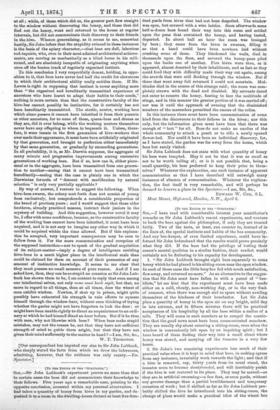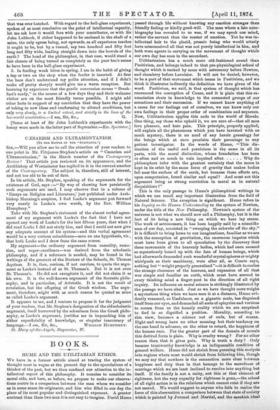[To THE EDITOR OF THE "SPECTATOR."
Sin,—I have read with considerable interest your contributor's remarks on Sir John Lubbock's recent experiments, and venture to back the bees against the philosopher, if only they are treated fairly. Two of the tests, at least, run counter to, instead of in the lines of, the special instincts and habits of the bee community. And any bee-keeper, of even limited experience, could have in- formed Sir John beforehand that the results would prove precisely what they did. If the bees had the privilege of testing their censor's mental qualities in a similar fashion, their verdict would certainly not be flattering to his capacity for development.
1. " Sir John Lubbock brought eight bees separately to some honey which he had placed in his sitting-room near the open window. In each of these cases the little busy bee fed with much satisfaction, flew away, and returned no more." As an alternative to the sugges- tion that Sir John must have fallen in with a parcel of " bee- idiots," let me hint that the experiment must have been made either on a cold, -cloudy, non-working day, or in the very flush of summer, when there was enough and to spare without availing themselves of the kindness of their benefactor. Let Sir John place a quantity of honey in the open air on any bright, mild day in late autumn, and in fifteen minutes there will be practical acceptances of his hospitality by all the bees within a radius of a mile. They will come in such numbers as to compel the convic- tion that the good news must haVe been communicated somehow. They are usually shy about entering a sitting-room, even when the window is conveniently left open by an inquiring spirit ; but I have heard of them finding their way into a small closet where honey was stored, and carrying off the treasure in a very few hours.
2. Sir John's two remaining experiments lose much of their practical value when it is kept in mind that bees, in seeking egress from any inclosure, invariably work towards the light ; and that if a hive is removed, say, thirty yards from its usual stand, the inmates seem to become dumbfounded, and will inevitably perish if the hive is not restored to its place. They may be moved—as they are in artificial swarming—a few feet, or even yards, without any greater damage than a partial bewilderment and temporary cessation of work ; but if shifted as far as Sir John Lubbock pro- bably shifted the hive he introduced into his sitting-room, the change of place would make a practical idiot of the wisest bee
that was ever hatched. With regard to the bell-glass experiment, spoken of as most conclusive on the point of intellectual capacity, let me ask how it would fare with your contributor, or with Sir John Lubbock, if either happened to be enclosed in the shaft of a mine, the only egress being, not upwards, as all experience teaches it ought to be, but by a tunnel, say two hundred and fifty feet long and fifty wide, leading straight down into the bowels of the earth ? The head of the philosopher, in that case, would stand a fair chance of being turned as completely as the poor bee's seems to have been in the bell-glass experiment.
3. In feeding weak hives in spring, I am in the habit of giving a tap or two on the sleep when the feeder is inserted. At first the bees don't understand my polite attention, and if I didn't make off pretty sharply would give me a warm reception. But learning by experience that the gentle concussion means " Break- fast's ready," in the course of a few days they and their welcome visitor are on the most friendly terms possible. I might add other facts in support of my conviction that they have the power of taking in new ideas and conforming to altered conditions, but only very slowly, to a limited extent, and strictly in the lines of the line-world constitution.—I am, Sir, &c., G. [Some at least of Sir John Lubbock's experiments with the honey were made in the latter part of September.—En. Spectator.]



































 Previous page
Previous page